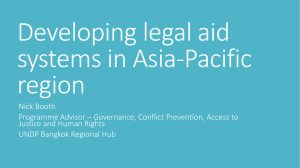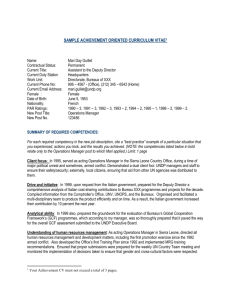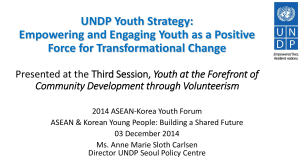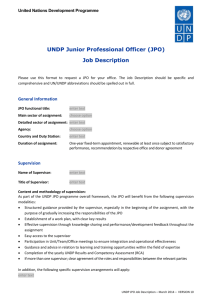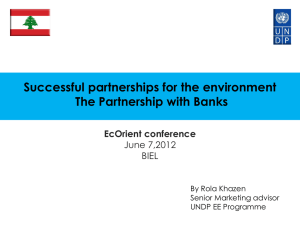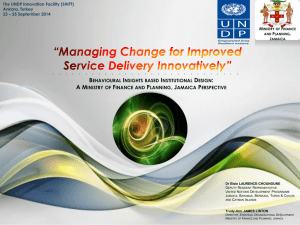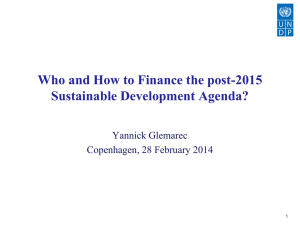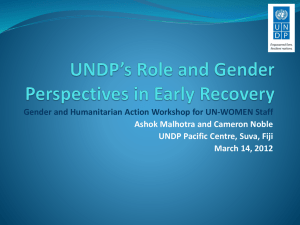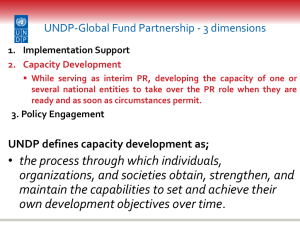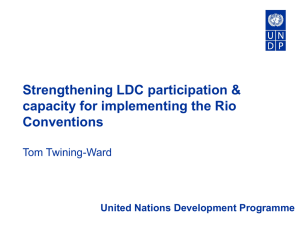What is UNDP?
advertisement
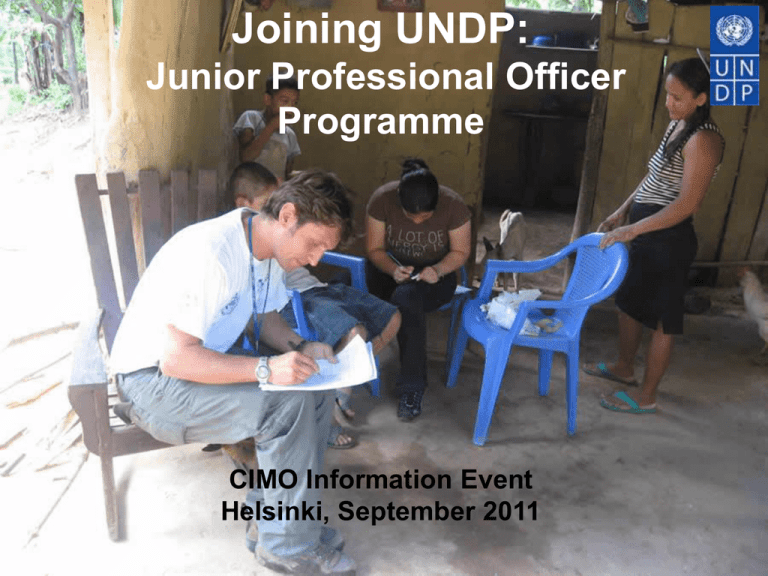
Joining UNDP: Junior Professional Officer Programme CIMO Information Event Helsinki, September 2011 What is UNDP? UNDP is the United Nations' global development network: • Advocating for change • Connecting countries to knowledge, experience and resources… • to help people build a better life. Strong values: • • • Commitment to working with the world’s most marginalized peoples, Professionalism & flexibility Integrity &respect for diversity Over 8,000 staff members worldwide (Headquarters in New York, over 135 Offices in the Field) UNDP’s overall objective “The achievements of the MDGs is firmly at the centre of our agenda. Everything we do should contribute directly or indirectly to those objectives.” Ms Helen Clark, Administrator of UNDP “All UNDP activities should aim at one end result: real improvements in people’s lives and in the choices and opportunities open to them.” UNDP Strategic Plan 2008 – 2013 UNDP’s field of action UNDP’s Practice Areas: • Democratic Governance • Poverty Reduction • Crisis Prevention & Recovery • HIV/AIDS • Environment and Energy Cross-Cutting Themes: • Women's Empowerment • Capacity Development Flagship: • The Human Development Report MDG – reality check How many children are enrolled in primary education in the developing world? o 49 % o 69 % o 89 % 89 % MDG – reality check How large a proportion of the world population have access to drinking water? o 47 % o 67 % o 87 % 87 % MDG – reality check Which country has the highest and the lowest child mortality rate? o Sri Lanka o Turkey o Estonia o USA • Turkey has the highest child mortality rate – it is more than the double of Sri Lanka’s • 32 out of 1000 children in Turkey die before their fifth birthday. In Sri Lanka it is 13 out of 1000. • The child mortality rates in Estonia and USA are at the same level – 9 deaths for every 1000 living born Entry Points into UNDP • • • • • • Regular short-term or longer-term contracts Junior Professional Officers (JPOs) Leadership Development Programme (LEAD): next in mid-2012. Key element of UNDP’s succession management strategy (but limited number of posts: 8 for Developed Countries on average) Consultancies United Nations Volunteers (UNVs) About internships: • Non-remunerated, limited to students who have not finished their studies • Decentralized selection process • An excellent learning opportunity, but not an entry point as such JPO Programme Objectives JPOs are young professionals with an academic background working in the field of development all over the world for a period of one to three years. • Financed by donor countries, which usually sponsor their own nationals. • To provide UNDP with talented young professionals to contribute to the objectives of the organization • To give exposure and build capacities among young professionals to work in the area of development cooperation • To build a network of development practitioners The UNDP JPO Programme in a Few Figures • • • • 17 active Donor Countries, usually only sponsoring their nationals 168 JPOs (average of 50 new JPOs each year) 43 Special Assistants to the Resident Coordinator (equivalent to senior JPOs) 90 Duty Stations, 21 Nationalities, average age: 31 years Post-JPO Career Development Support Career Counselling: •Pre-departure briefing •One-to-one / remote advice sessions •Career Management website: http://www.jposc.org/career_management •JPO thematic Workshops •Mentoring Activities Networking: •JPO Alumni Association (JAA): 1800 members •Online discussion groups (JPO-Net, Facebook & LinkedIn groups) •Directory of current and former JPOs Job Search: •Advocacy towards potential internal/external employers •Weekly Job Ads bulletin •Online CV Roster on which JPO CVs can be uploaded JPO Career Paths • In 2001-2009, 50% of over 700 UNDP JPOs were retained (35% still work with the UN & 15% now work elsewhere) • Former JPOs account for at least 15% of the current UNDP professional staff • One in four current UN Resident Coordinators are former JPOs • 25% returned to their home countries to continue work in the field of international cooperation (Ministry of Foreign Affairs, NGOs, consultancy companies, research) • 10% continued their career in the private sector • Grasp career opportunities: needs for staff in crisis countries and in the field in general, needs for specialists, flexibility (in terms of contracts, moves, lifestyle) Follow-up Discussion Questions and comments are welcome Thank you for your attention! Please also visit our dedicated website for more information: www.jposc.org


